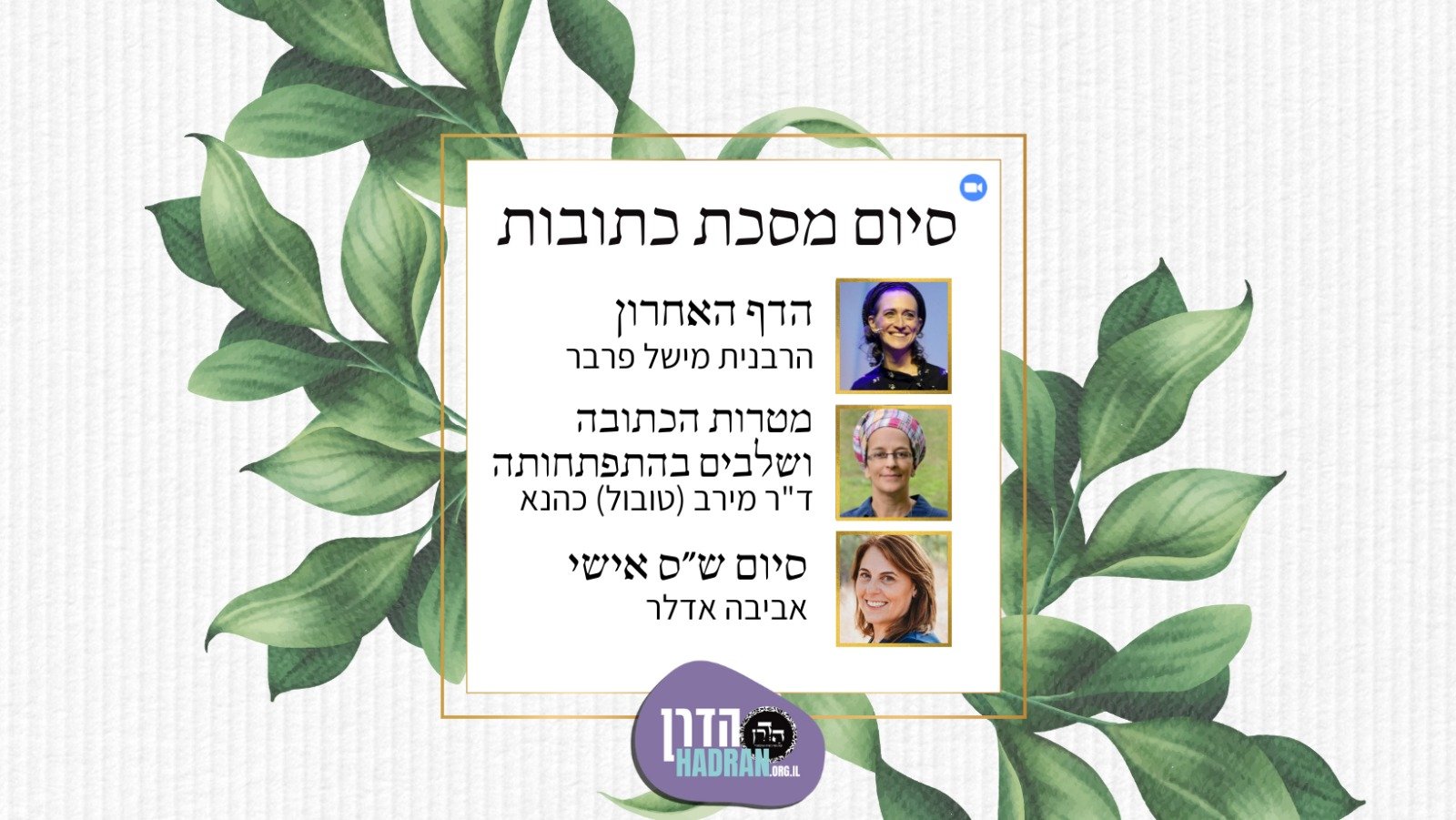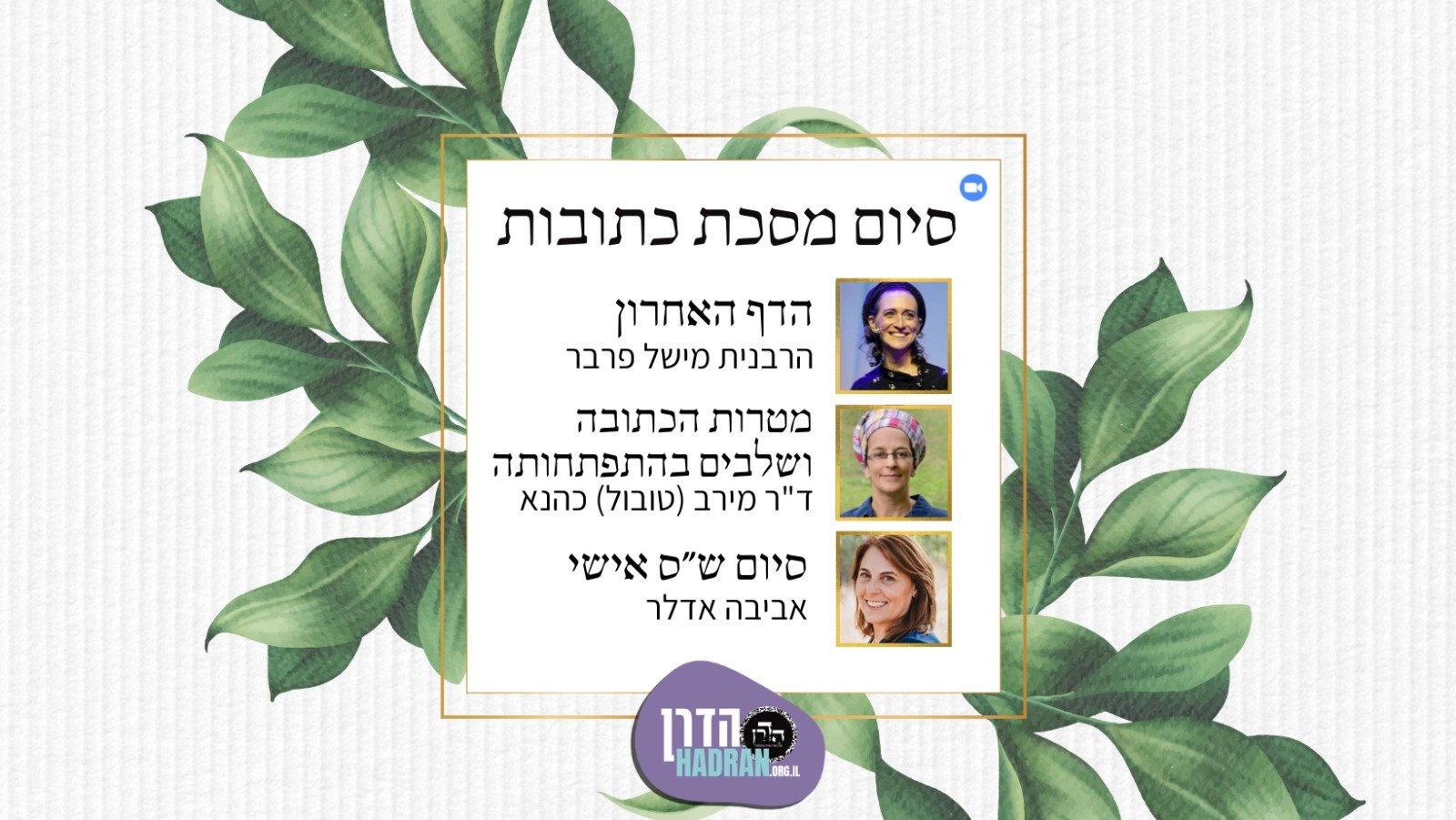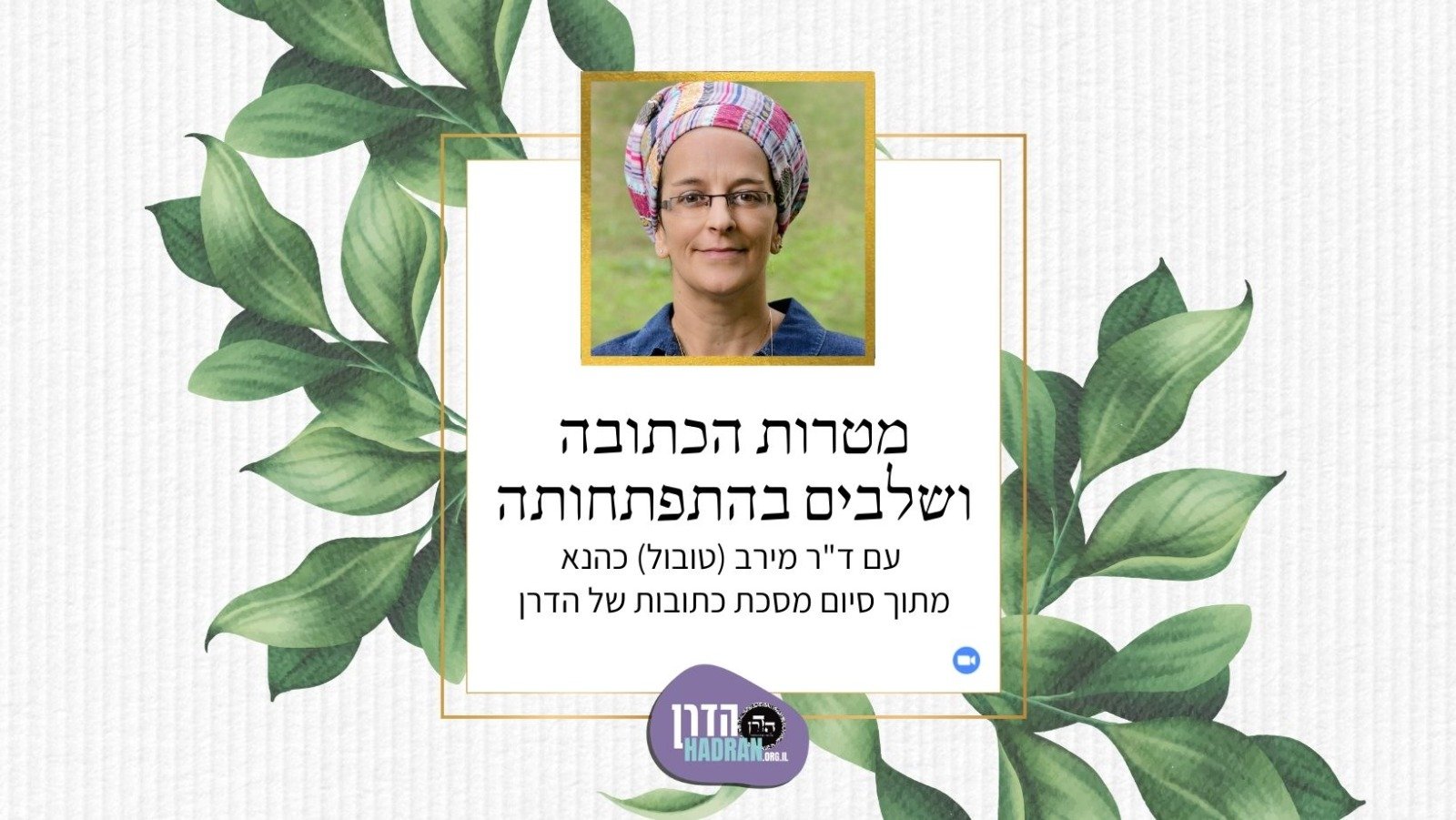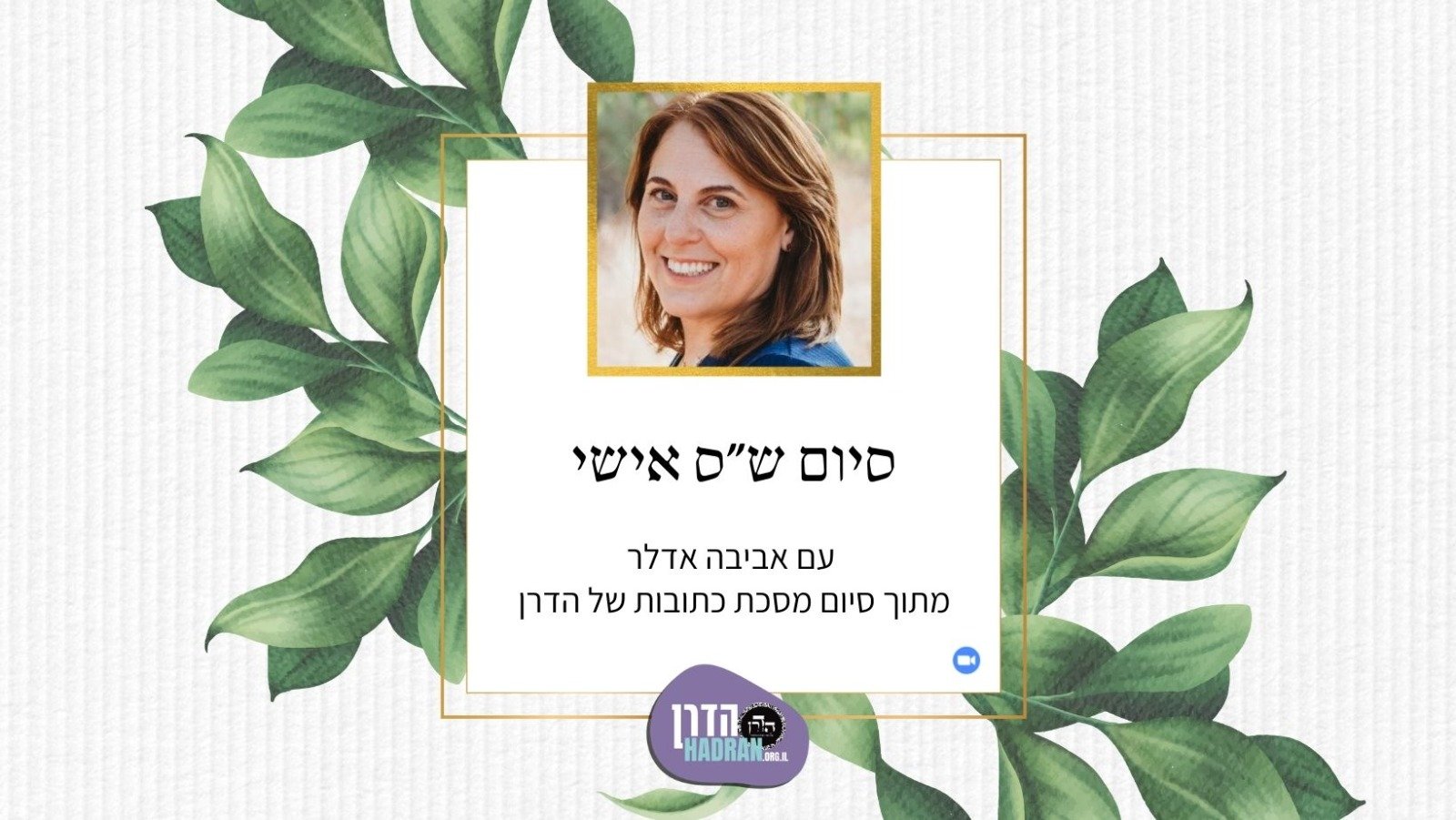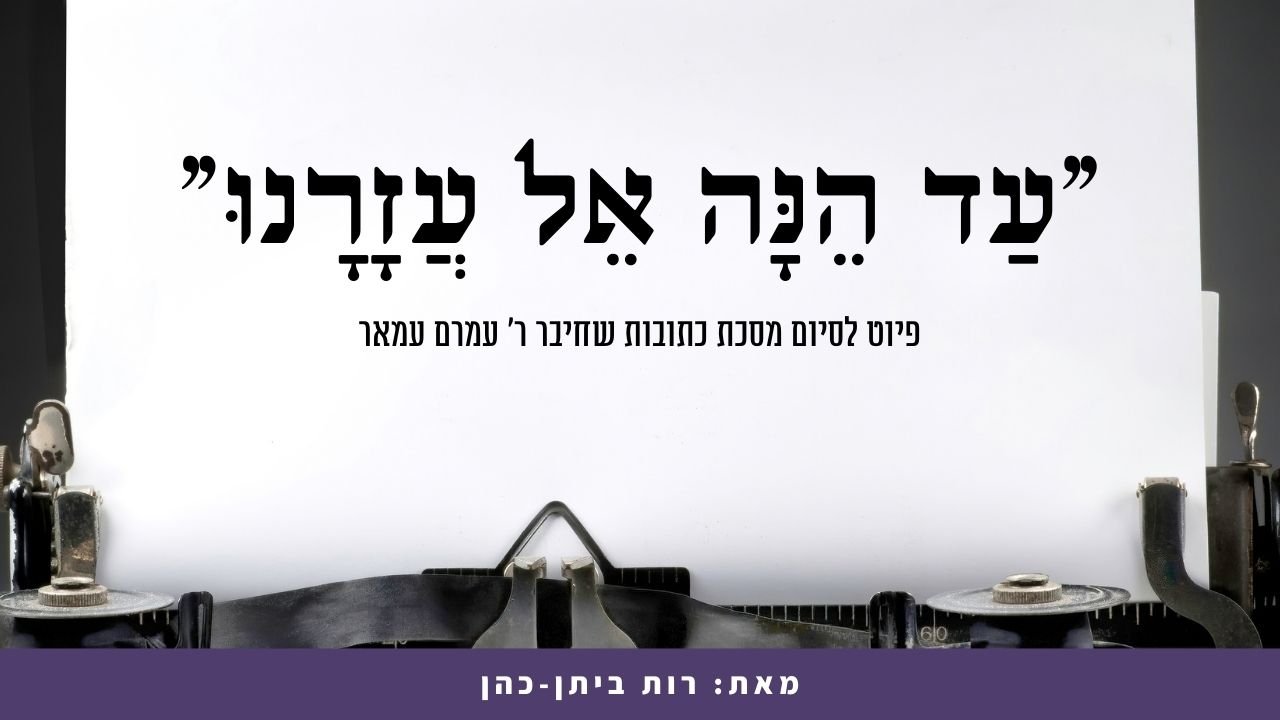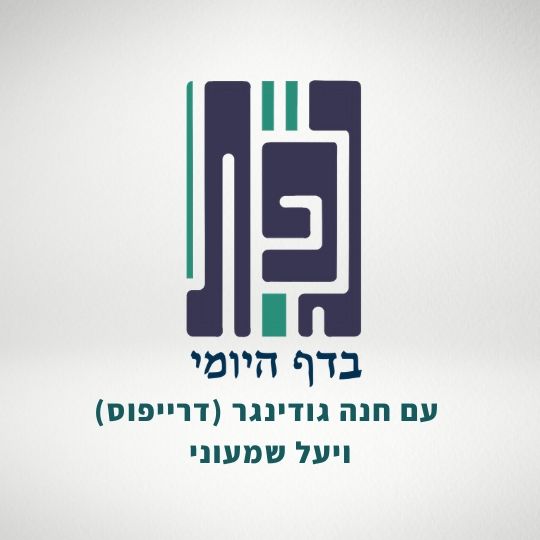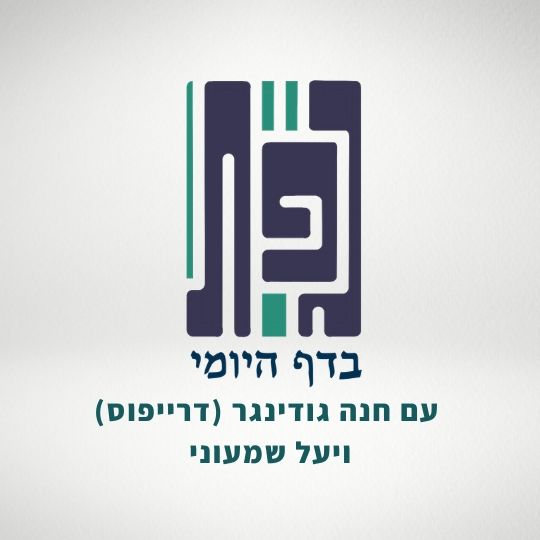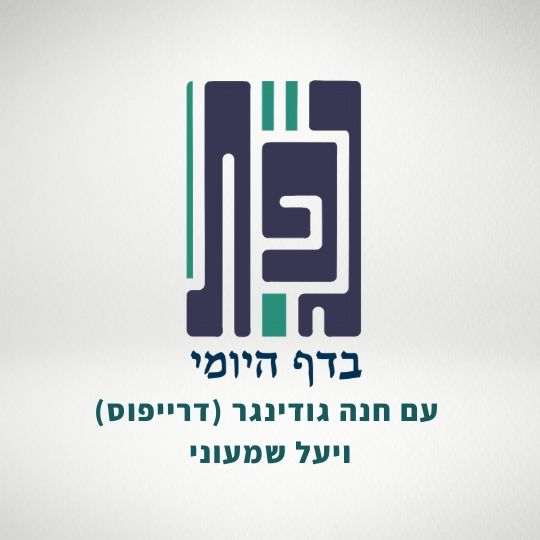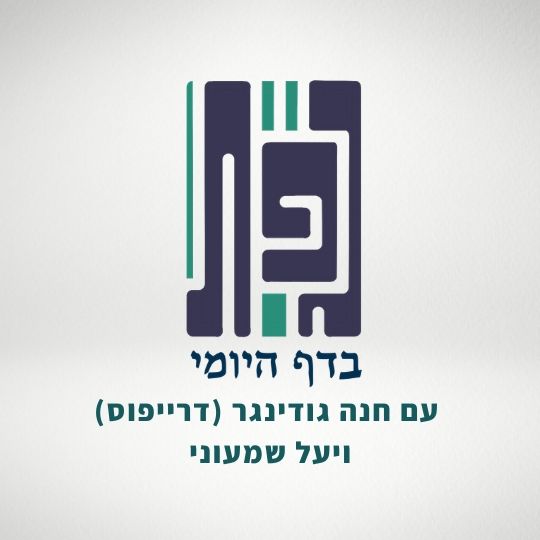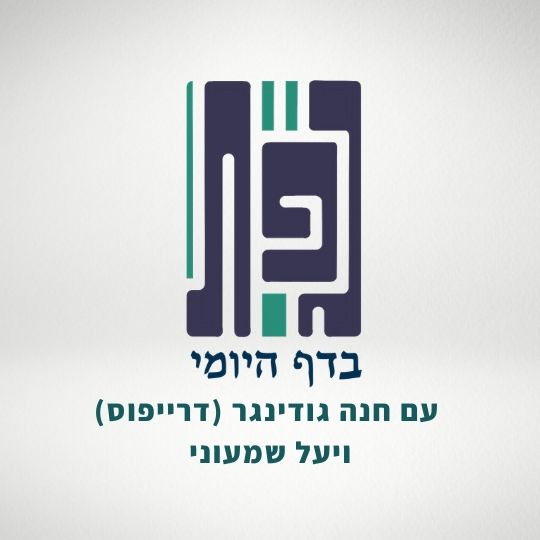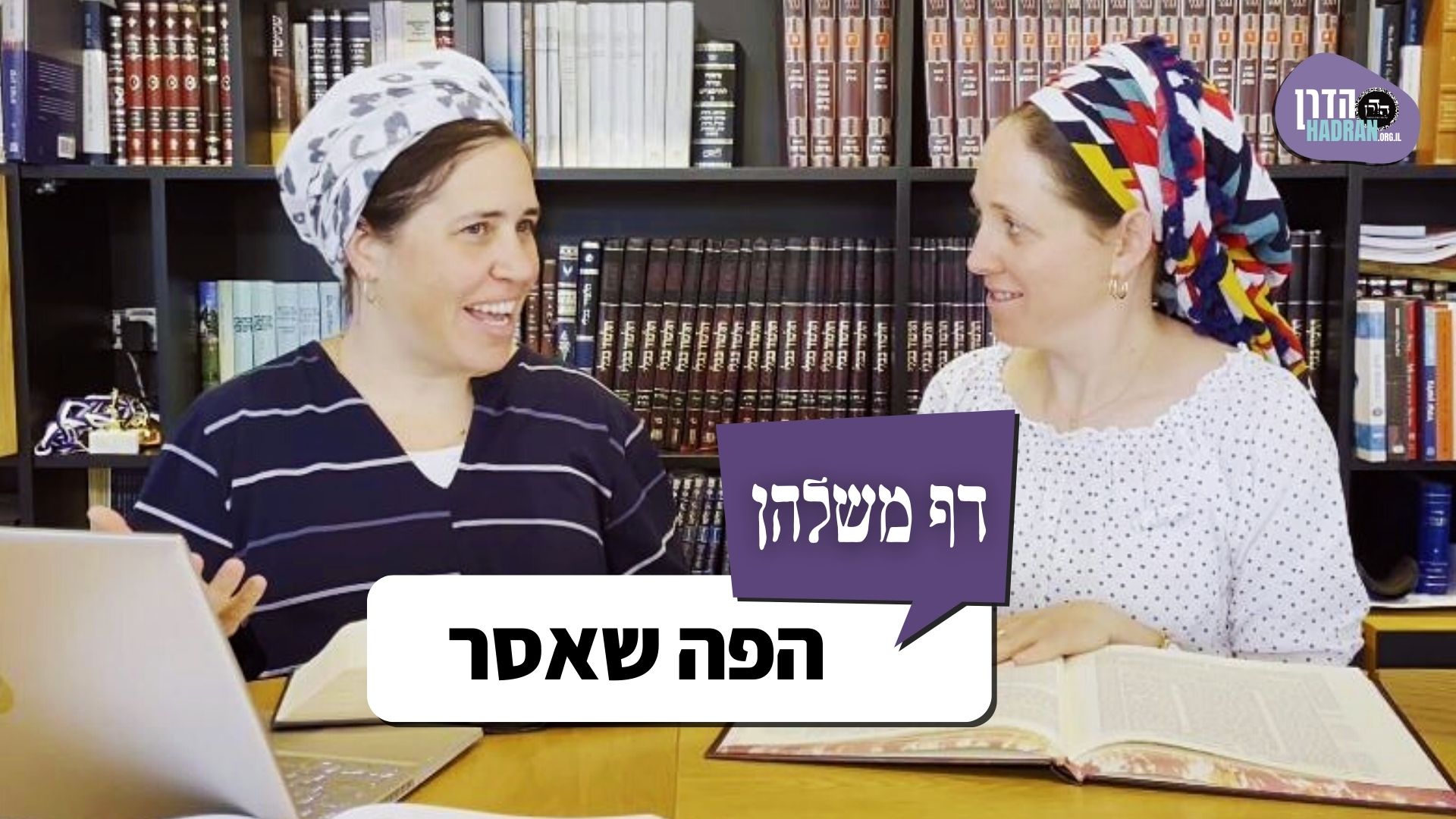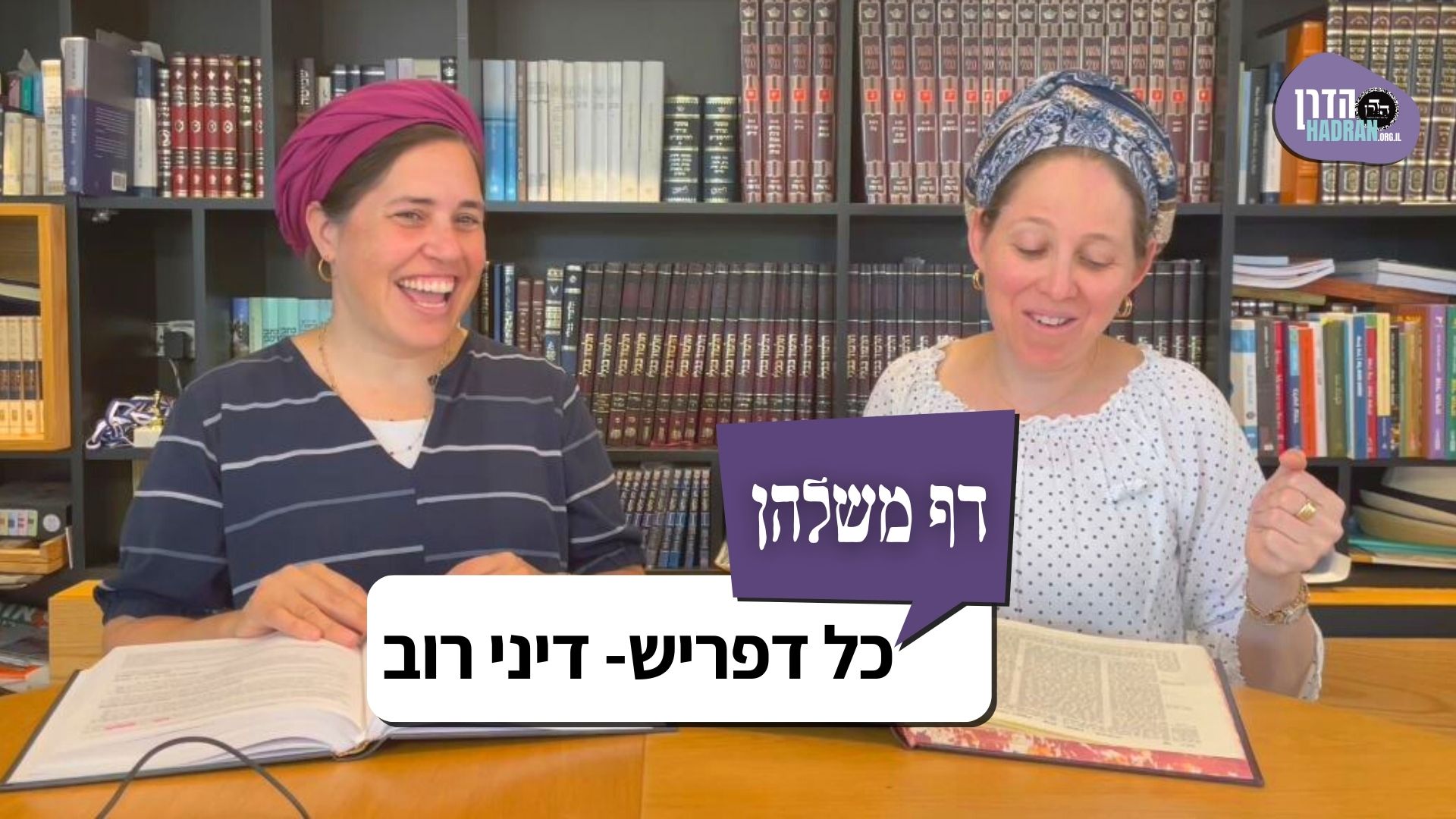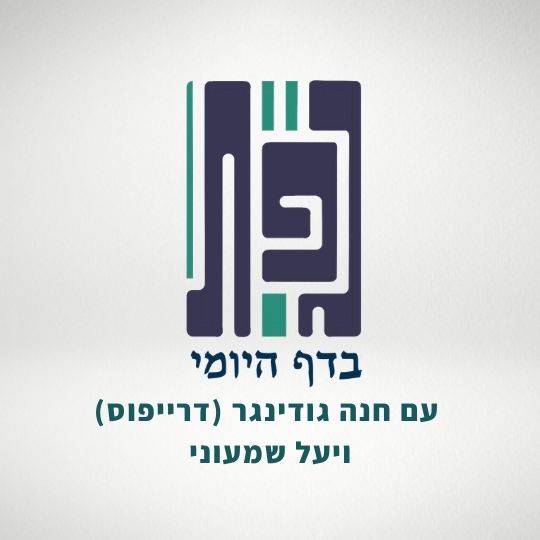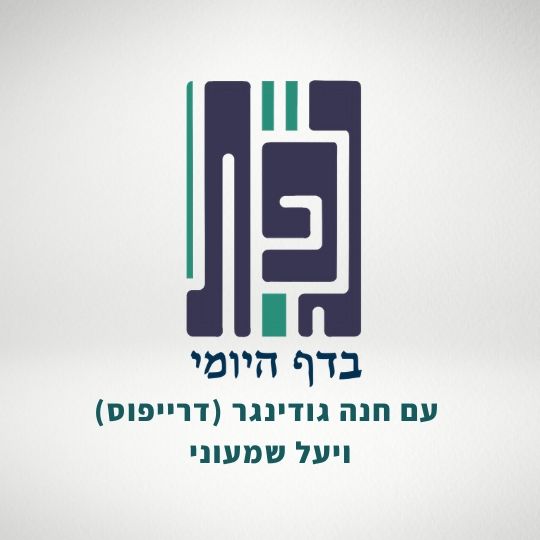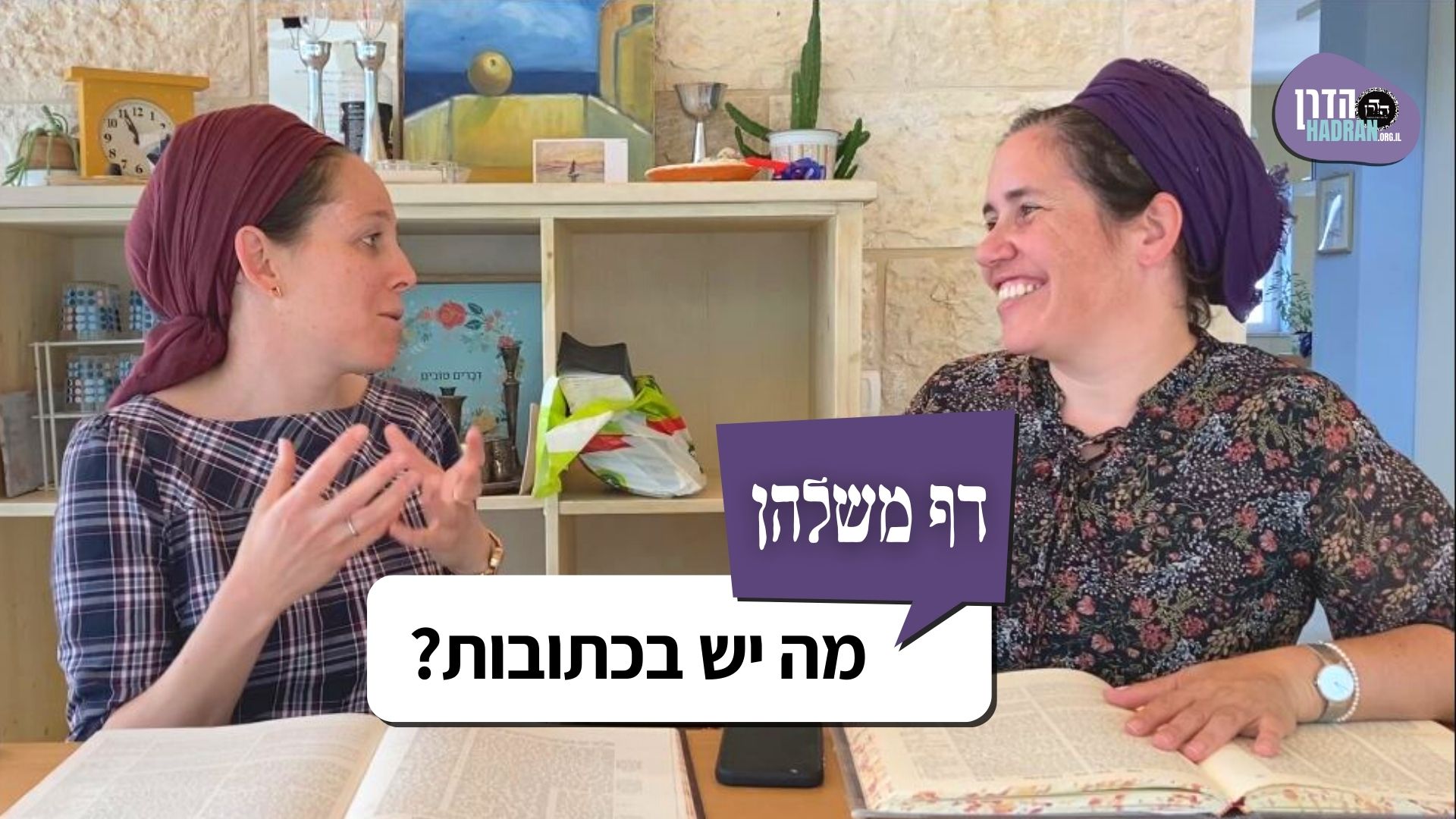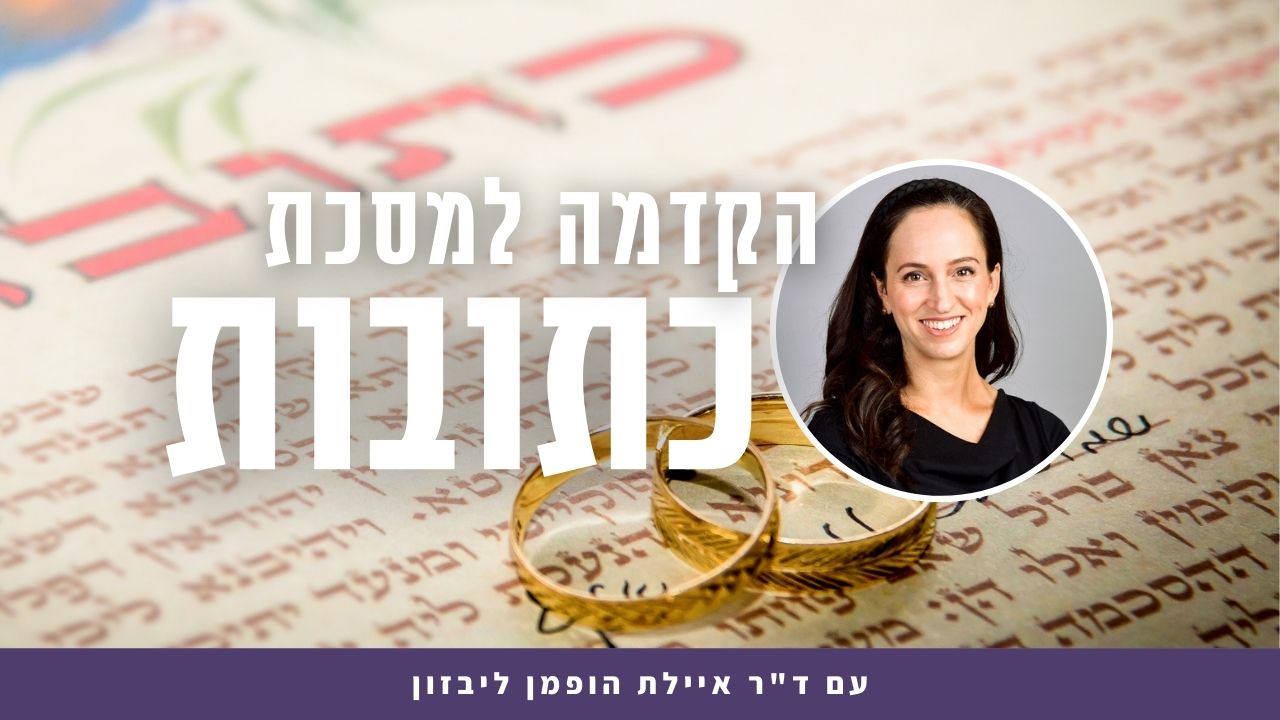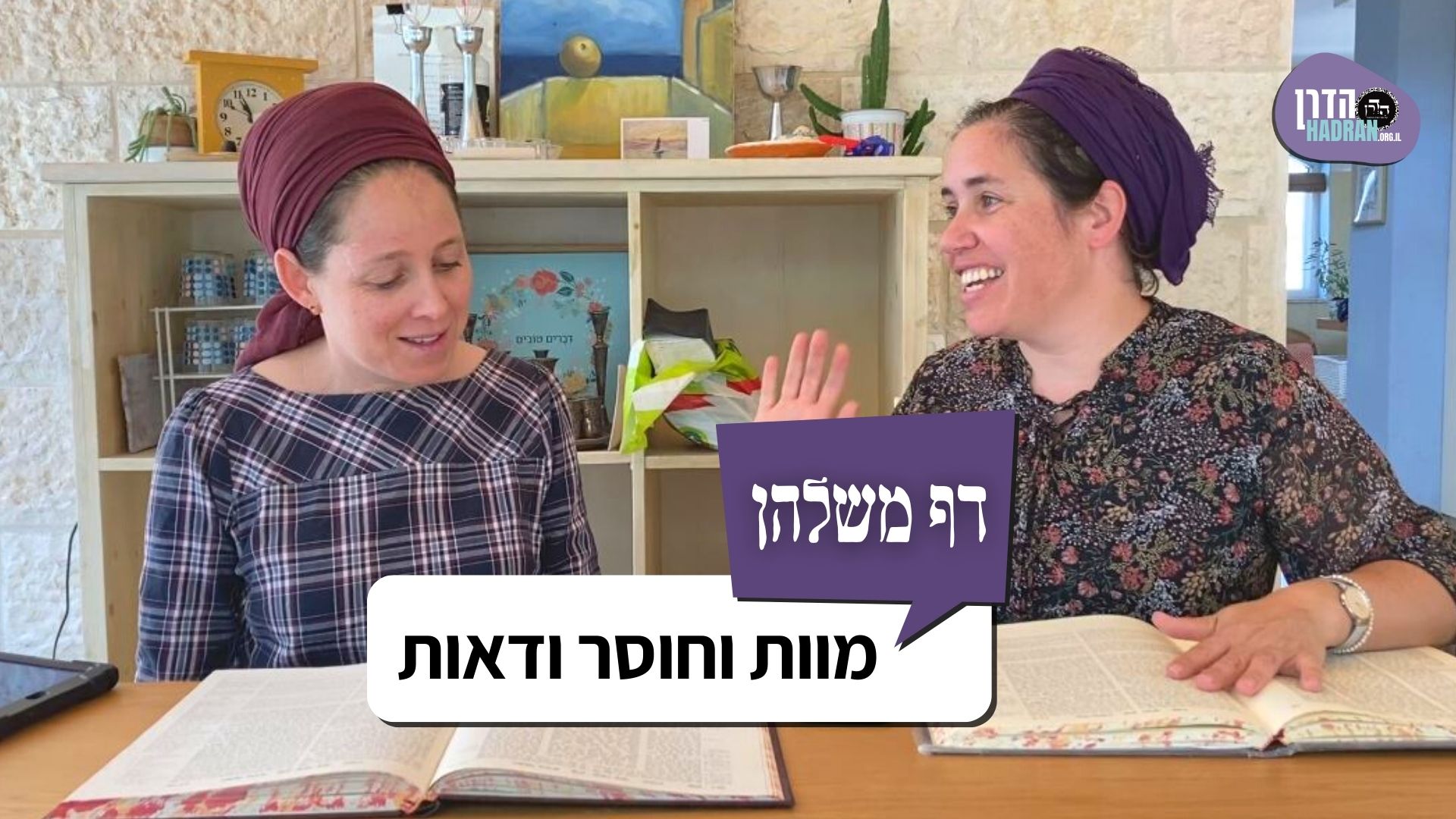כתובות יד
אִין, מִינַּאי. אָמַר רַב יוֹסֵף: לְמַאי נֵיחוּשׁ לַהּ? חֲדָא, דְּהָא קָא מוֹדֵה. וְעוֹד, הָא אָמַר רַב יְהוּדָה אָמַר שְׁמוּאֵל: הֲלָכָה כְּרַבָּן גַּמְלִיאֵל.
Yes, she conceived from relations with me. Rav Yosef said: The ruling here is clear, as with regard to what suspicion need we be concerned? First, he concedes that he is the father. And furthermore, didn’t Rav Yehuda say that Shmuel said: The halakha is in accordance with the opinion of Rabban Gamliel, and even if he didn’t admit that the child was his, the woman’s claim is accorded credibility?
אֲמַר לֵיהּ אַבָּיֵי: וּבְהָא, כִּי לָא מוֹדֵה מַכְשַׁר רַבָּן גַּמְלִיאֵל? וְהָאָמַר לֵיהּ שְׁמוּאֵל לְרַב יְהוּדָה: שִׁינָּנָא, הֲלָכָה כְּרַבָּן גַּמְלִיאֵל, וְאַתְּ לָא תַּעֲבֵיד עוֹבָדָא עַד דְּאִיכָּא רוֹב כְּשֵׁרִין אֶצְלָהּ. וְהָכָא — רוֹב פְּסוּלִין אֶצְלָהּ!
Abaye said to him: And in this case, based on the fact that you cited two reasons to deem the child fit, is that to say when he does not admit that he is the father Rabban Gamliel deems the child fit? But didn’t Shmuel say to Rav Yehuda: Big-toothed one, the halakha is in accordance with the opinion of Rabban Gamliel, i.e., that she is accorded credibility, but you should not perform an action based on this ruling unless the majority of the men in her proximity are honorable and of impeccable lineage, corroborating her claim. And here, since she is betrothed, the majority of the men in her proximity are unfit, as a child fathered by any man other than her betrothed is a mamzer. Shmuel should not have ruled that the halakha was in accordance with the opinion of Rabban Gamliel.
וְלִיטַעְמָיךְ תִּקְשֵׁי לָךְ הִיא גּוּפַהּ: הֲלָכָה, וְאַתְּ לָא תַּעֲבֵיד עוֹבָדָא?! אֶלָּא מַאי אִית לָךְ לְמֵימַר: הָא — לְכַתְּחִלָּה, הָא — דִּיעֲבַד. וְהָא נָמֵי, כְּדִיעֲבַד דָּמֵי.
Rav Yosef said to Abaye: And according to your reasoning, the halakha itself should pose a difficulty for you, as on the one hand Shmuel rules that it is the halakha and on the other hand he adds: But you should not perform an action based on this ruling. Rather, what have you to say to explain this contradiction? This statement that one relies on the woman’s claim only if a majority of men in her proximity are of unflawed lineage is ab initio. That statement that one may rely on the woman’s claim regardless of the status of the men in her proximity is after the fact. And this case of the betrothed woman, too, is like a case after the fact, as failure to rely on her claim will render her child a mamzer. Therefore, in this case, Shmuel would rule that the halakha is in accordance with the opinion of Rabban Gamliel.
רָמֵי לֵיהּ אַבָּיֵי לְרָבָא: וּמִי אָמַר רַבִּי יְהוֹשֻׁעַ אֵינָהּ נֶאֱמֶנֶת? וּרְמִינְהוּ: הֵעִיד רַבִּי יְהוֹשֻׁעַ וְרַבִּי יְהוּדָה בֶּן בְּתֵירָא עַל אַלְמְנַת עִיסָּה, שֶׁהִיא כְּשֵׁרָה לַכְּהוּנָּה.
§ Abaye raised a contradiction before Rava from a mishna (Eduyyot 8:3): Did Rabbi Yehoshua say that the woman is not deemed credible and her claim is not accepted? And the Gemara raises a contradiction: Rabbi Yehoshua and Rabbi Yehuda ben Beteira testified concerning the widow whose late husband was a member of a priestly family of questionable lineage [issa], that she is fit to marry into the priesthood. Since the matter is uncertain, the woman retains her presumptive status of fitness and her late husband is presumed to be of unflawed lineage.
אֲמַר לֵיהּ: הָכִי הַשְׁתָּא?! הָתָם: אִשָּׁה נִישֵּׂאת, בּוֹדֶקֶת וְנִישֵּׂאת. הָכָא, אִשָּׁה מְזַנָּה בּוֹדֶקֶת וּמְזַנָּה?!
Rava said to him: How can these cases be compared? There, in the case of the widow, one could say: A woman who marries investigates the lineage of her prospective husband before the wedding and only then marries. Therefore, one may rely on her presumptive status of fitness and deem her fit to marry a priest. Here, can it be said that a woman who engages in licentious intercourse investigates the lineage of her partner and only then engages in licentious intercourse?
אָמַר רָבָא: דְּרַבִּי יְהוֹשֻׁעַ אַדְּרַבִּי יְהוֹשֻׁעַ קַשְׁיָא, דְּרַבָּן גַּמְלִיאֵל אַדְּרַבָּן גַּמְלִיאֵל לָא קַשְׁיָא? וְהָא קָתָנֵי סֵיפָא: אָמַר לָהֶן רַבָּן גַּמְלִיאֵל: קִבַּלְנוּ עֵדוּתְכֶם, אֲבָל מָה נַעֲשֶׂה שֶׁהֲרֵי גָּזַר רַבָּן יוֹחָנָן בֶּן זַכַּאי שֶׁלֹּא לְהוֹשִׁיב בֵּית דִּין עַל כָּךְ, שֶׁהַכֹּהֲנִים שׁוֹמְעִין לָכֶם לְרַחֵק אֲבָל לֹא לְקָרֵב.
Rava said with regard to the contradiction that was raised: Is the contradiction between one statement of Rabbi Yehoshua and another statement of Rabbi Yehoshua difficult, and the contradiction between one statement of Rabban Gamliel and another statement of Rabban Gamliel not difficult? But isn’t it taught in the latter clause of that mishna with regard to the widow whose late husband was from a priestly family of questionable lineage that Rabban Gamliel said to them: We accept your testimony that this is the halakha, but what can we do, as Rabban Yoḥanan ben Zakkai decreed not to convene a court for this purpose of ruling the woman fit, because the priests obey you when your ruling calls to distance a woman of questionable lineage from marrying them, but not when your ruling calls to bring her near and deem her fit to marry them. Apparently, Rabban Gamliel did not accept the lenient ruling in the case of the widow, contrary to his statement here that she is accorded credibility.
אֶלָּא אָמַר רָבָא: דְּרַבָּן גַּמְלִיאֵל אַדְּרַבָּן גַּמְלִיאֵל לָא קַשְׁיָא: הָתָם — בָּרִי, הָכָא — שֶׁמָּא.
Rather, Rava said: The contradiction between one statement of Rabban Gamliel and another statement of Rabban Gamliel is not difficult. There, in the case of the woman who engaged in intercourse with an unidentified man, her claim that the lineage of the man is unflawed is a certain claim. Here, in the case of the widow, her claim that his lineage is unflawed is an uncertain claim, because there is objective uncertainty with regard to his lineage.
דְּרַבִּי יְהוֹשֻׁעַ אַדְּרַבִּי יְהוֹשֻׁעַ נָמֵי לָא קַשְׁיָא: הָתָם — חַד סְפֵיקָא, הָכָא — תְּרֵי סְפֵיקֵי.
The contradiction between one statement of Rabbi Yehoshua and another statement of Rabbi Yehoshua is similarly not difficult. There, in the case of the woman who engaged in intercourse with an unidentified man, there is only one uncertainty: Is the lineage of the man with whom she engaged in intercourse flawed or unflawed? In the case of one uncertainty, the ruling is stringent. Here, in the case of the widow, there are two uncertainties with regard to the objective situation. It is established that there is uncertainty with regard to one of the members of the family whether or not he is a ḥalal. The first uncertainty is whether her late husband is the member of that family with regard to whom the uncertainty exists. Even if it is established that her late husband is indeed the one with regard to whom the uncertainty exists, there remains an uncertainty whether he is in fact a ḥalal.
הִלְכָּךְ, לְרַבָּן גַּמְלִיאֵל: אַלִּים לֵיהּ בָּרִי, דַּאֲפִילּוּ בְּחַד סְפֵיקָא נָמֵי מַכְשִׁיר. וְקִיל לֵיהּ שֶׁמָּא, דַּאֲפִילּוּ בִּסְפֵק סְפֵיקָא נָמֵי פָּסֵיל. לְרַבִּי יְהוֹשֻׁעַ: אַלִּים לֵיהּ חַד סְפֵיקָא, דַּאֲפִילּוּ בְּבָרִי נָמֵי פָּסֵיל, וְקִיל לֵיהּ סְפֵק סְפֵיקָא, דַּאֲפִילּוּ בִּשְׁמָא נָמֵי מַכְשִׁיר.
Therefore, according to Rabban Gamliel, a certain claim is so powerful for him that even in a case where there is one uncertainty, he also deems her fit to marry a priest. And an uncertain claim is so insignificant for him that even in a case where there is a compound uncertainty, he also deems her unfit to marry a priest. According to Rabbi Yehoshua, a case where there is one uncertainty is so powerful for him that even in a case where she makes a certain claim, he also deems her unfit. And the case of a compound uncertainty is so insignificant for him that even if she makes an uncertain claim, he also deems her fit.
תָּנוּ רַבָּנַן: אֵיזוֹהִי אַלְמְנַת עִיסָּה? כֹּל שֶׁאֵין בָּהּ לֹא מִשּׁוּם מַמְזֵרוּת, וְלֹא מִשּׁוּם נְתִינוּת, וְלֹא מִשּׁוּם עַבְדֵי מְלָכִים. אָמַר רַבִּי מֵאִיר:
§ Apropos the widow, the Rabbis taught: Who is the widow whose late husband was a member of a priestly family of questionable lineage and is fit to marry a priest? It is one who married into any family that does not have the status of being unfit, neither due to uncertain mamzer status, nor due to uncertain Gibeonite status, nor due to uncertain status as slaves of kings, who would force Jewish women, even daughters of priests, to marry them. Rabbi Meir said:
שָׁמַעְתִּי, כֹּל שֶׁאֵין בָּהּ אֶחָד מִכׇּל אֵלּוּ — מַשִּׂיאִין לַכְּהוּנָּה.
I heard that with regard to the widow of any family that has none of these uncertainties associated with it, one allows her to marry members of the priesthood. The only uncertainty where this ruling applies is in the case of uncertain ḥalal status.
רַבִּי שִׁמְעוֹן בֶּן אֶלְעָזָר אוֹמֵר מִשּׁוּם רַבִּי מֵאִיר, וְכֵן הָיָה רַבִּי שִׁמְעוֹן בֶּן מְנַסְיָא אוֹמֵר כִּדְבָרָיו: אֵיזוֹהִי אַלְמְנַת עִיסָּה — כֹּל שֶׁנִּטְמַע בָּהּ סְפֵק חָלָל.
Rabbi Shimon ben Elazar says in the name of Rabbi Meir, and likewise Rabbi Shimon ben Menasya would say in accordance with his statement: Who is the widow whose late husband was a member of a priestly family of questionable lineage? It is a widow who marries into any family in which a person with regard to whom there is uncertainty whether or not he is a ḥalal was assimilated among its members. Therefore, she is referred to as a widow of dough [issa]. Just as dough is the result of a mixture of several ingredients, this family too has a person with regard to whom there is uncertainty whether he is a ḥalal mixed within it.
מַכִּירִין יִשְׂרָאֵל מַמְזֵרִים שֶׁבֵּינֵיהֶם, וְאֵין מַכִּירִין חֲלָלִין שֶׁבֵּינֵיהֶם.
The reason for the distinction between uncertain ḥalal status and uncertain mamzer status is that Jews identify the mamzerim that are among them, and there is no concern lest they assimilate into families of unflawed lineage. But they do not identify the ḥalalin among them. Therefore, there is concern lest a ḥalal assimilate into the family.
אָמַר מָר: אֵיזוֹהִי אַלְמְנַת עִיסָּה — כֹּל שֶׁאֵין בָּהּ לֹא מִשּׁוּם מַמְזֵרוּת, וְלֹא מִשּׁוּם נְתִינוּת, וְלֹא מִשּׁוּם עַבְדֵי מְלָכִים. הָא חָלָל — כָּשֵׁר.
The Gemara analyzes the baraita. The Master said in the baraita: Who is the widow whose late husband was a member of a priestly family of questionable lineage? It is one who married into any family that does not have the status of being unfit, neither due to uncertain mamzer status, nor due to uncertain Gibeonite status, nor due to uncertain status as slaves of kings. The Gemara infers: However, if it is due to uncertain ḥalal status, her marriage to a priest is deemed fit.
מַאי שְׁנָא הָנָךְ — דְּאוֹרָיְיתָא, חָלָל נָמֵי דְּאוֹרָיְיתָא! וְתוּ, אָמַר רַבִּי מֵאִיר: שָׁמַעְתִּי, כֹּל שֶׁאֵין בָּהּ אֶחָד מִכׇּל אֵלּוּ מַשִּׂיאִין לַכְּהוּנָּה, הַיְינוּ תַּנָּא קַמָּא?!
The Gemara asks: What is different about these flaws in lineage, uncertain mamzer status and Gibeonite status, which render her unfit to marry a priest by Torah law? A ḥalal also renders her unfit by Torah law. And furthermore, the baraita continues: Rabbi Meir said: I heard that with regard to the widow of any family that has none of these uncertainties associated with it, one marries her to members of the priesthood. That is identical to the opinion of the first tanna. If there is uncertainty with regard to one in the late husband’s family that he is a mamzer or a Gibeonite, she is unfit to marry a priest; if the uncertainty is with regard to ḥalal status, she is fit to marry a priest. What novel element does Rabbi Meir introduce?
וְתוּ: רַבִּי שִׁמְעוֹן בֶּן אֶלְעָזָר אוֹמֵר מִשּׁוּם רַבִּי מֵאִיר, וְכֵן הָיָה רַבִּי שִׁמְעוֹן בֶּן מְנַסְיָא אוֹמֵר כִּדְבָרָיו: אֵיזוֹהִי אַלְמְנַת עִיסָּה — כֹּל שֶׁנִּטְמַע בָּהּ סְפֵק חָלָל, מַכִּירִין יִשְׂרָאֵל מַמְזֵרִים שֶׁבֵּינֵיהֶן וְאֵין מַכִּירִין חֲלָלִין שֶׁבֵּינֵיהֶן. וְהָא אָמְרַתְּ רֵישָׁא, חָלָל כָּשֵׁר!
The baraita continues: And furthermore, Rabbi Shimon ben Elazar says in the name of Rabbi Meir, and likewise, Rabbi Shimon ben Menasya would say in accordance with his statement: Who is the widow whose late husband was a member of a priestly family of questionable lineage? It is a widow who marries into any family in which a person with regard to whom there is uncertainty whether or not he is a ḥalal was assimilated. Because Jews identify the mamzerim that are among them there is no concern that they will assimilate into families of unflawed lineage, but Jews do not identify the ḥalalin among them. Due to the concern that a ḥalal assimilated into the family, the widow is unfit to marry a priest. The Gemara asks: But didn’t you say in the first clause of the baraita that if there is uncertainty whether or not a ḥalal was assimilated among its members, her marriage to a priest is deemed fit?
אָמַר רַבִּי יוֹחָנָן: מַמְזֵר צוֹוֵחַ וְחָלָל שׁוֹתֵק אִיכָּא בֵּינַיְיהוּ: תַּנָּא קַמָּא סָבַר: כֹּל פְּסוּל דְּקָרוּ לֵיהּ וְשָׁתֵיק — פָּסוּל. וְהָכִי קָאָמַר תַּנָּא קַמָּא: אֵיזוֹהִי אַלְמְנַת עִיסָּה — כֹּל שֶׁאֵין בָּהּ לֹא שְׁתוּק מַמְזֵרוּת, וְלֹא שְׁתוּק נְתִינוּת, וְלֹא שְׁתוּק עַבְדֵי מְלָכִים, וְלֹא שְׁתוּק חָלָל.
Rabbi Yoḥanan said: The case of one who when called mamzer screams and protests that he is being slandered, and when called ḥalal is silent, is the subject of the dispute between the tanna’im in the baraita. The first tanna holds: Anyone who when others call him unfit and he is silent, is unfit, as his silence confirms the allegation. And this is what the first tanna is saying: Who is the widow whose late husband was a member of a priestly family of questionable lineage, who is fit to marry a priest? It is one who married into any family that has neither unfitness due to silence in response to allegations of mamzer status, nor silence in response to allegations of Gibeonite status, nor silence in response to allegations that they are slaves of kings, nor silence in response to allegations of ḥalal status. Only a woman who was married into a family that protested in response to all these allegations is fit to marry a priest.
וְקָאָמַר לֵיהּ רַבִּי מֵאִיר: הָנָךְ הוּא דְּקָא פָּסֵיל לֵיהּ בְּקָהָל, אֲבָל שְׁתוּק חָלָל — כָּשֵׁר. וְהָא דְּשָׁתֵיק — מִשּׁוּם דְּלָא אִיכְפַּת לֵיהּ.
And Rabbi Meir is saying to him: Specifically, each of those silent in response to allegations of mamzer or Gibeonite status or allegations that they are slaves of kings are rendered unfit because these allegations render him unfit to marry into the congregation of Israel. However, despite silence in response to allegations of ḥalal status, her marriage to a priest is deemed fit. And the fact that he is silent is due to his indifference, as even were he deemed a ḥalal the only restriction would be with regard to marriage to priests.
וְקָאָמַר לֵיהּ רַבִּי שִׁמְעוֹן בֶּן אֶלְעָזָר לְתַנָּא קַמָּא דְּרַבִּי מֵאִיר: אִי שְׁמִיעַ לָךְ דְּמַכְשַׁר רַבִּי מֵאִיר בִּשְׁתִיקָה — לָא דְּקָרוּ לֵיהּ ״חָלָל״ וְשָׁתֵיק, אֶלָּא דְּקָרוּ לֵיהּ ״מַמְזֵר״ וְשָׁתֵיק. וְהַאי דְּשָׁתֵיק, סָבַר מַמְזֵר קָלָא אִית לֵיהּ. אֲבָל מַמְזֵר וְצוֹוֵחַ, חָלָל וְשׁוֹתֵק — פָּסוּל. וְהַאי דְּאִשְׁתִּיק, סָבַר מִיסָּתְיֵיהּ דְּלָא מַפְּקִי לֵיהּ מִקָּהָל.
And Rabbi Shimon ben Elazar is saying to the first tanna who quoted Rabbi Meir as saying: I heard, etc. If you heard that Rabbi Meir deems her marriage to a priest fit, in a case of silence in response to allegations, it is not in a case where they called him ḥalal and he is silent; rather, it is in a case where they call him mamzer and he is silent. In that case, the reason he is silent is that he holds: The fact that one is a mamzer generates publicity, and since he is not reputed to be a mamzer, he is indifferent to the allegation. However, in a case where he is called mamzer and he screams in protest, or where he is called ḥalal and he is silent, he is unfit. And the fact that he is silent and does not protest is because he holds: It is sufficient for him that they do not expel him from the congregation of Israel.
תָּנֵי חֲדָא, רַבִּי יוֹסֵי אוֹמֵר: שְׁתוּק מַמְזֵר — כָּשֵׁר, שְׁתוּק חָלָל — פָּסוּל. וְתַנְיָא אִידַּךְ: שְׁתוּק חָלָל — כָּשֵׁר, שְׁתוּק מַמְזֵר — פָּסוּל.
The Gemara notes: It is taught in one baraita that Rabbi Yosei says: Despite the fact that with silence in response to allegations of mamzer one is fit; silence in response to allegations of ḥalal renders one unfit. It is taught in another baraita: Despite the fact that with silence in response to allegations of ḥalal one is fit; silence in response to allegations of mamzer renders one unfit.
לָא קַשְׁיָא: הָא תַּנָּא קַמָּא אַלִּיבָּא דְּרַבִּי מֵאִיר, הָא דְּרַבִּי שִׁמְעוֹן בֶּן אֶלְעָזָר אַלִּיבָּא דְּרַבִּי מֵאִיר.
The Gemara explains: The contradiction between the baraitot is not difficult. This second baraita is the opinion of the first tanna in accordance with the opinion of Rabbi Meir, who holds that silence in response to allegations of ḥalal does not render one unfit. And this first baraita is the opinion of Rabbi Shimon ben Elazar in accordance with the opinion of Rabbi Meir, who holds that silence in response to allegations of mamzer is motivated by indifference and does not render him unfit; however, silence in response to allegations of ḥalal is an indication that the allegations are true and he is unfit.
מַתְנִי׳ אָמַר רַבִּי יוֹסֵי: מַעֲשֶׂה בְּתִינוֹקֶת שֶׁיָּרְדָה לְמַלּאוֹת מַיִם מִן הָעַיִן, וְנֶאֱנָסָה. אָמַר רַבִּי יוֹחָנָן בֶּן נוּרִי: אִם רוֹב אַנְשֵׁי הָעִיר מַשִּׂיאִין לִכְהוּנָּה, הֲרֵי זוֹ תִּינָּשֵׂא לִכְהוּנָּה.
MISHNA: Rabbi Yosei said: There was an incident involving a young girl who descended to fill her jug with water from the spring, and she was raped, and the identity of the rapist was unknown. Rabbi Yoḥanan ben Nuri said: If the majority of the people of the city marry their daughters to members of the priesthood, this young girl may be married to a member of the priesthood.
גְּמָ׳ אֲמַר לֵיהּ רָבָא לְרַב נַחְמָן: רַבִּי יוֹחָנָן בֶּן נוּרִי דְּאָמַר כְּמַאן? אִי כְּרַבָּן גַּמְלִיאֵל — אֲפִילּוּ בְּרוֹב פְּסוּלִין נָמֵי מַכְשַׁר. אִי כְּרַבִּי יְהוֹשֻׁעַ — אֲפִילּוּ בְּרוֹב כְּשֵׁרִים נָמֵי פָּסֵיל! אֲמַר לֵיהּ, הָכִי אָמַר רַב יְהוּדָה אָמַר רַב:
GEMARA: Rava said to Rav Naḥman: In accordance with whose opinion is it that Rabbi Yoḥanan ben Nuri stated his opinion? If it is in accordance with the opinion of Rabban Gamliel, even in a case where the majority of the people are of flawed lineage as well, he deems her fit to marry into the priesthood. If it is in accordance with the opinion of Rabbi Yehoshua, even in a case where the majority of the people are of unflawed lineage, he deems her unfit to marry into the priesthood. Rav Naḥman said to Rava that this is what Rav Yehuda said that Rav said:

